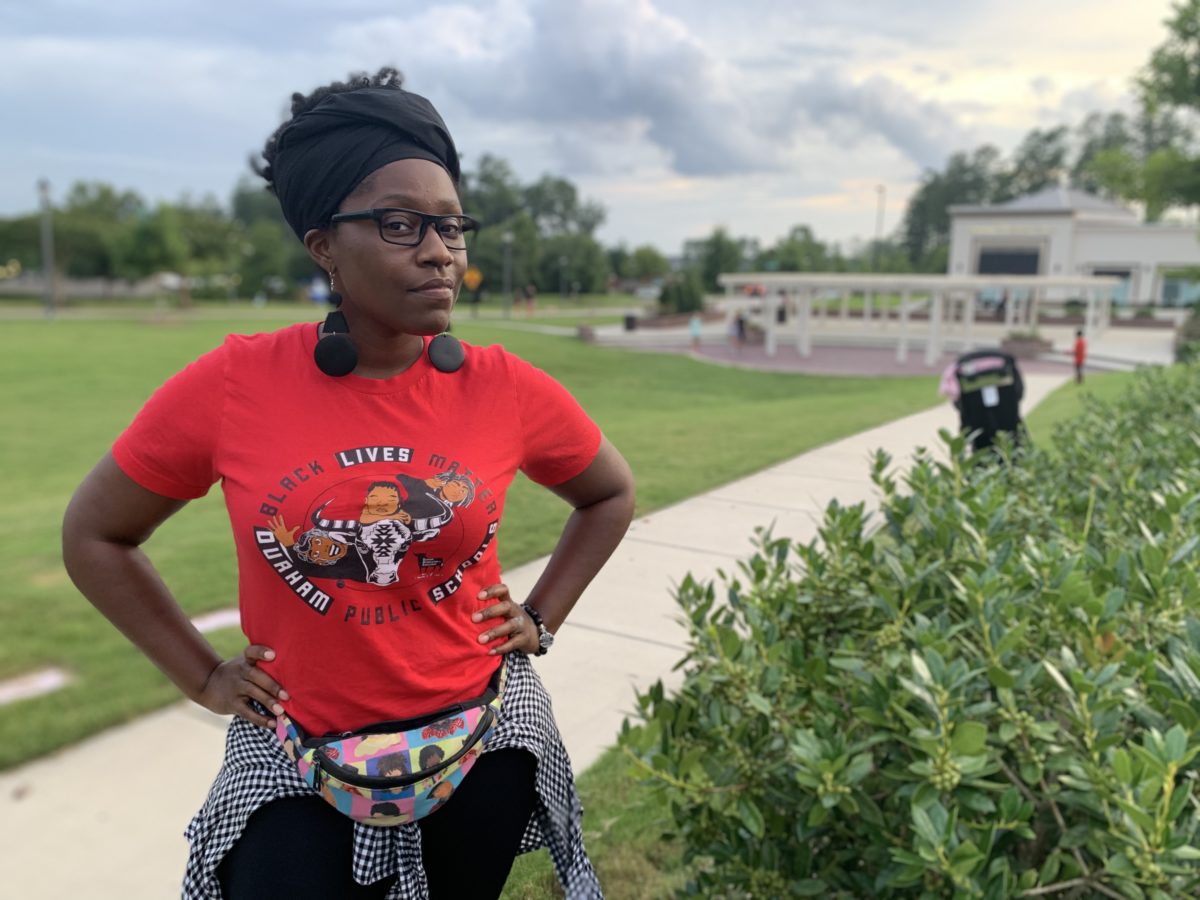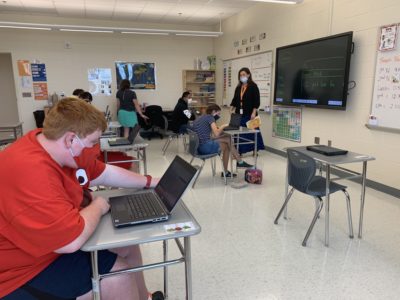

It’s evident from listening to state and local school board meetings that decisions in the time of COVID-19 are not easy. Some parents and politicians have advocated for a return to in-person instruction, while the state’s largest educator organization has expressed concerns about returning to school buildings without proper precautions.
Meanwhile, last week, Gov. Roy Cooper announced that elementary schools can return to plan A, full-time in-person instruction, as early as Oct. 5.
Many educators are watching and listening to the debates as officials determine what their jobs will look like in the coming months. Is it safest to stay remote, or is remote learning lacking?
“It can be both things,” Durham educator Turquoise LeJeune Parker said. “It can be bad for everyone to just be back, and it can be bad to do remote like this.”
In Davie County Schools, officials voted to go plan B with hybrid in-person and remote instruction while keeping the building at 50% capacity. While educators we spoke with like being back in the building, it hasn’t made everything ideal.
“We’re all just trying to continue to be encouraging while going through all of this plan B, 50%,” EC Director Jennifer Custer said. “The teaching hasn’t stopped, and the beginning-of-the-year struggles are natural struggles, but all this feels like so much more to learn how to navigate in this environment.”
Durham Public Schools is in plan C — all virtual instruction. Parker and two of her colleagues say that’s the right decision, but that hasn’t felt ideal, either.
Parker is a specials teacher at Lakewood Elementary in Durham Public Schools and a board member for the North Carolina Association of Educators.
She has been a teacher for 10 years and still makes less than $40,000 a year. She knew she wouldn’t get rich teaching, but she became a third-generation teacher because she knew working with kids would light up her spirit.
Looking for side jobs to supplement her income, she has considered online tutoring in the past. But she doesn’t come across as a strong candidate during interviews, she says.
“Because one of the questions is like, why do you want to teach online?” she said. “And I don’t want to teach online. I like teaching in person.”
Suffice it to say, she’s not a big fan of remote teaching.
“I dig building relationships with my kids, my colleagues,” she said. “I dig that level of teamwork and learning and growing that you can only get in person.”
She stopped scrolling on her phone a few months back when she saw a meme — “Teachers can do virtually anything,” it read, with an emphasis on the word virtually.
She likes the sentiment behind the motivational meme, but it’s not completely reflective of how she feels inside.
“Let’s be optimistic, yeah,” she said. “But also, don’t be dismissive of the frickin’ difficulty that is this moment. It’s hard. It’s stressful. And it’s driving folks away. And it’s making people be like, ‘I hate teaching.’ And it’s making folks sick. A teacher literally passed out at work recently because the stress was too much.”
Symone Kiddoo is a social worker splitting time between two schools in Durham. She misses seeing her students. And she worries that all the kids who need referrals to her aren’t being served.
“It’s a tough place to be in, to be an educator,” she said. “You’re basically like, ‘Hey, kid, we went to virtual school because we want you to be safe. But we also know that it’s awful.'”
Aja Johnson, a school counselor at Durham’s Club Boulevard Magnet Elementary, misses seeing her kids in the hall. Some of them may not know they need time with her, but she can tell by seeing their faces when she runs into them. And with her door always open, it’s easy for them to stop by anytime at the school building.
“I want to make sure that they are healthy and that I am healthy,” Johnson said. “So there’s this part of it where I shouldn’t be with them, but I also have this desire to see the kids and provide them with everything that they need. I feel stuck in the middle. There’s no easy answer for any of this.”
When she decided to work with elementary students, Johnson’s father reminded her that not every child she works with is getting hugs at home.
“He always said, ‘Go hug somebody’s child, because somebody’s not getting a hug they need,'” Johnson said. “So, not being in the building with them physically, not giving them the hug they might need, it’s hard.”
But feeling disconnected, these educators say, is better than being unsafe.
The fact that they serve a population of students and families in Durham who are disproportionally affected by COVID-19 exacerbates the conflict.
“You tell the parents, yes, we know Zoom learning can be awful,” Kiddoo said. “But the other option is putting you in a building where you or a loved one could potentially die.”
Parker is holding out hope that schools and districts will focus less on the remote vs. in-person debate and more on innovation in the current environment. DPS has instituted Wellness Wednesdays where no curriculum is taught and educators emphasize social-emotional care.
That’s a start, she says, but to make remote learning work better, she wants to see a different approach to teaching curriculum and reexamining accountability and testing.
For now, the waivers for required standardized tests that came last spring when schools first shut down have not been extended to this school year — meaning teachers have to maintain pacing in a largely virtual environment.
“In the virtual world, you cannot force what was pre-March 13, 2020, and squeeze that into a computer screen,” Parker said. “You just can’t. It wasn’t in a computer screen for a reason. This is our chance to rethink, reimagine, tear down all of that, and rebuild it. Give our kids a chance to really think and grow.”
For now, she feels as if she’s stuck trying to shoehorn past lesson plans into a world where they don’t fit. As a result, teaching — her passion and calling — feels different.
“I’m happy to see the kids every day, but I leave sad every day,” Parker said. “Because it’s not the same.”


